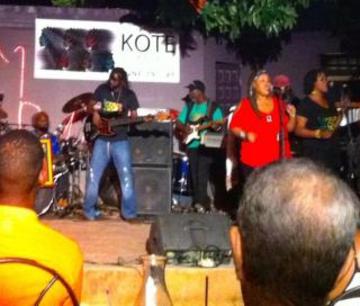A Trip to the Library of the Spoken Word
Voices Across Borders
The Blog of the Race and Resistance Research Network at TORCH
Posted by: Justine McConnell
Date: 9th October 2015
A Trip to the Library of the Spoken Word
The whitewashed gateposts of the University of the West Indies campus in Mona, just outside Kingston, Jamaica still hint at the site’s previous life as a sugar plantation. The lush grounds stretch out from the main road towards the south-eastern edge where the record-breaking sprinter Usain Bolt trains on a track which he persuaded his German sponsors to donate to the university.
The site of the university is a catalogue of the island’s rich history: from a seventeenth century slave plantation, to a World War Two camp for Gibraltarian refugees, to separation from the University of London in 1962, the same year that the country gained Independence. The remains of an aqueduct from its plantation-era days bisect the grounds. The eighteenth-century university chapel was originally built as a rum store in northwest Jamaica before being dismantled stone by stone and moved south to Mona in the 1950s at the suggestion of Princess Alice, granddaughter of Queen Victoria, and first Chancellor of the university.
Crossing over the busy Mona Road, I reach the University Archives and the office of the affable Sean Mock Yen, one of the archivists, and my generous guide for the day. Sean is a Kingstonian through-and-through. “Born under the clock,” he tells me, referring to the large clocktower on Half Way Tree Road in the centre of the city. The university campus has been a consistent presence in Sean’s life, from his childhood when he played in the grounds as his mother worked, to his current job in the remarkable Library of the Spoken Word.
The library is in the new Central Administration building, where ferocious air-conditioning offers welcome respite from the sweaty heat outside. The building is a hub for the University of the West Indies, whose structure was ahead of its time with satellite campuses scattered across the Caribbean since the 1960s. There are major centres in Trinidad and Barbados, and smaller ones, both physical and virtual, stretching across sixteen countries in the English-speaking Caribbean. Ahead of its time, too, is the Library of the Spoken Word, which is so little advertised that Sean wondered how I’d heard about it.
Sean has worked with the collection for more years than he cares to remember, archiving hundreds of hours of material with a doting parent’s pride and care. As we sit side by side in front of the mixing desk, he skips between recordings and across decades, from the 1950s to the present, playing me rare recordings of Jamaican Poet Laureate Mervyn Morris, Nobel Prize-winning writer Derek Walcott, dub poet Richard ‘Dingo’ Dingwall, and a reading by Earl Lovelace from his novel, Salt, which brought home the fact that, really, this is a novel that was always intended to be read aloud. A reading by Wole Soyinka of his poem ‘Muhammad Ali at the Ringside’ earned an appreciative chuckle from Sean’s colleagues in the office next door. Many of these recordings were first broadcast by the university’s Radio Education Unit, which had a remit similar to the Open University’s educational TV programmes.
Sean began working on the archive when it was still part of the radio station, and knows it inside out. Sitting in a room, which to my inexperienced eye, contains some impressive looking audio-visual technology, he gives me a tour of the range and treasures of the library. The dexterity with which he skips through the library’s cassette tapes, compact disks and old-fashioned audio reels, is all the more impressive given that the collection is still not fully catalogued. The long process is underway but money is short, meaning recordings are only digitised individually, and only on demand.
The library is an impressive literary resource but the collection also reveals the value that is ascribed to performance poetry and the spoken word in Jamaica. Reggae music, undoubtedly Jamaica’s most recognisable cultural export, has its roots in the oral poetry tradition archived in the Library of the Spoken Word.
After a day at the archives I said goodbye to Sean and headed over to the Redbones Café, a glorious outdoor venue serving delicious rum-based cocktails, fresh seafood, and the ubiquitous Red Stripe beer, all in front of a stage overhung by luscious mango trees. That evening was the launch of Kingston on the Edge Urban Art Festival, now in its seventh year. The vibrant celebration of Kingston’s diverse arts scene includes photography, dance, poetry, film, music, and literature. There were roots reggae and art exhibitions, new poetry and old stories, all reminding me that the literary legacy archived at the Library of the Spoken Word is still very much alive and kicking in Kingston’s artists today.
Justine McConnell is a Leverhulme Early Career Fellow at TORCH, working on contemporary African, Caribbean, and ancient Greek poetics.
Voices Across Borders is always looking for new Race and Resistance Research network members to contribute to this blog. If you would like to write a piece, or if you have a response to a blog entry you have read here, please e-mail the Voices Across Borders editor, Tessa Roynon (tessa.roynon@ell.ox.ac.uk).
The viewpoints expressed in Voices Across Borders are those of the individual contributors and do not necessarily represent the views of the University of Oxford.

University of the West Indies, Mona campus

'Launch of Kingston on the Edge Urban Art Festival 2015 at Redbones Cafe, Jamaica'
Race and Resistance across Borders in the Long Twentieth Century



